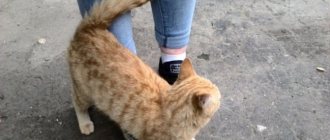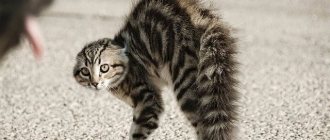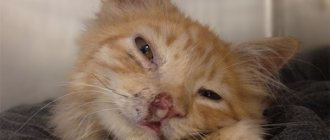What does the cat’s “Apchhi!” mean?
First, let's agree that if a cat sneezes, say, 1-2 times a day, then there is no point in talking about any problem. The pussy may, for example, sneeze after inhaling dust particles or sand particles. But if the animal sneezes frequently, looks sick, and refuses to eat, then you should be wary and also make an appointment with a veterinarian as soon as possible.
To understand the problem, consider the reasons why a cat sneezes:
- Allergy
– a cat often sneezes when the nasal mucosa is irritated as a result of an allergy. A pet can be sensitive to a variety of substances: air fresheners, dust, pollen, smoke, fragrance oils, and so on. With allergies, cats not only sneeze, they may experience discharge from the eyes, skin rashes, vomiting, and shortness of breath; - Infectious diseases
of a viral, fungal or bacterial nature - with rhinotracheitis, bordetellosis, chlamydia, aspergillosis, cryptococcosis and other diseases, the cat may experience frequent sneezing (in some cases with blood). The symptoms of all these diseases vary, but there is something in common: the cat has a fever, coughs, refuses to eat, mucus or pus comes out of her nose, her eyes are often inflamed, there may be stool disorders; - Foreign bodies stuck in the nasal cavity
- almost all cats are naturally curious, so small pebbles, twigs, and beads often get into their small nasal passages. Sometimes insects become foreign bodies. Any foreign object that gets into a cat's nose can cause uncontrollable sneezing, discharge from the nostrils (usually mucous, but if the nose is damaged, blood may also be present), anxiety, heavy and noisy breathing; - Nasal polyps
– if there are neoplasms on the mucous membrane of a cat’s nose, then in such cases the animal constantly sneezes, rubs its nose with its paw, sniffles, and clear snot flows from its nose; - Asthma
- a cat sneezes and coughs and has problems with the bronchi. The mucous membranes of an animal with asthma turn pale, breathing becomes hoarse, the pet swallows air with an open mouth, looks weak and apathetic; - Oncology of the nasal cavity
- fortunately, nasal cancer is rare in cats, and usually such a serious illness occurs in older animals. More often than others, this type of oncology is observed in European shorthaired cats. With cancer, a pet sneezes blood, loses its sense of smell, bumps may appear on its face, and tears flow from its eyes. If the disease is advanced, the unfortunate purr loses a lot of weight, does not eat, and suffers from cramps. Unfortunately, non-treatment (or untimely assistance) is fraught with the death of the animal, while proper therapy gives a chance to save the long-eared pet friend; - Worms
- if your cat is coughing, sneezing and has watery eyes, then the problem may be nasty worms that have infected the respiratory system. With worms, animals lose weight, lose their external luster, experience nausea and intestinal problems.
Foreign object
Our fluffies quite often sniff surrounding objects (especially new ones), and can inhale dust, hairs and their undercoat, particles of litter, small threads, and so on.
The nasal canals of cats are thin, for this reason the smallest object clogs the passage, thereby severely irritating the mucous membrane. And then the cat begins to sneeze reflexively.
This situation can be identified by the following signs:
- The cat snorts;
- Repeatedly scratches nose with paws;
- Rubs a certain part of the muzzle against other objects, furniture, etc.;
- Constantly sneezes.
In this situation, discharge may form - usually it is a slightly thick transparent mucus. This is a natural defense of the body that helps clear the nasal passage. If the mucous membrane is damaged, then ichor or blood may be present in the mucus.
In what cases should you consult a doctor?
So, sneezing that seems harmless at first glance can often be a sign of a serious illness. What should the owner do if the animal constantly suffers from sneezing? Of course, you need to go to the doctor as soon as possible. In the following cases, you should contact a specialist immediately:
- If you sneeze and there is blood coming from your nose (what if it’s cancer?);
- If your cat has snot or pus flowing profusely and constantly from her nose;
- If the cat breathes hoarsely with an open mouth;
- If, in addition to sneezing, there are other symptoms of ill health (fever, reluctance to eat, cough, etc.).
Bacterial infection and viruses
The entry of pathogens into the nasopharynx can lead to bacterial inflammation. This is accompanied by profuse sneezing and thick purulent discharge from the nose, predominantly yellow or green.
In this case, the animal behaves lethargically and may refuse food. Treatment in this case is prescribed by a veterinarian, since it is necessary to use antibacterial drops, taking into account the type of pathogen.
A dangerous condition in which a cat often sneezes is a virus. Associated symptoms of viral diseases:
- Thick runny nose;
- Inflammation of the eyes (conjunctivitis);
- Refusal of food and water;
- Vomit;
- Diarrhea.
Cat viruses are dangerous, especially for kittens and older animals. There is no specific treatment; supportive therapy is carried out to adjust the animal’s immunity to fight the virus. If the described symptoms appear, the animal requires urgent hospitalization.
What to do if your cat sneezes
Actually, sneezing can be treated at home only after visiting a doctor. Depending on the cause of the sneezing, you will need:
- In case of allergies
, the cause of the allergy is determined, diet therapy and possibly antihistamines are prescribed; - For a viral infection
- antibiotics (antibiotic therapy), anti-inflammatory drugs (symptomatic therapy); - For bacterial infections
- the use of antibiotics and probiotics, immunotherapy; - For fungal infections
- antifungal drugs (antimycotics); - If foreign bodies enter the respiratory tract
, endoscopic removal of the object from the cat’s nose, administration of anti-inflammatory drugs if necessary; - For nasal polyps
– surgical removal of tumors; - For asthma
, cats are prescribed glucocorticosteroids, antibiotics (if the disease is caused by an infection), the use of inhalers, and placement in an oxygen chamber during an attack; - For cancer of the nasal cavity
- chemotherapy or radiation therapy, surgery (rhinotomy); - For lung worms
- deworming drugs, anti-inflammatory drugs, vitamins.
All of the above measures to eliminate diseases that contribute to sneezing are carried out only after visiting a specialist. At home, unfortunately, even the most vigilant owner will not be able to determine what caused the pet to sneeze.
Heartworm infection in a cat
It is extremely rare, but still occurs in practice, that such cute creatures as cats become infected with heartworms when they find themselves in places with very high air humidity and a maximum number of mosquitoes. Why these insects? Yes, because it is through their bite that the parasite is transmitted to the pet. The heartworms themselves, once in the cat’s body, affect the right side of the heart, as well as the lungs. As a result, the arteries become clogged, it becomes difficult to breathe, and coughing and sneezing begins. And the end is often sad - a heart attack and death.
To protect your mustachioed pet from these parasites, follow the following preventive measures:
- maintain strong immunity,
- ensure proper diet and lifestyle.
And when traveling outdoors, you can prepare a special mosquito repellent in advance (dilute citronella with plain water). This composition will reduce the risk of parasite infection to a minimum, which will undoubtedly preserve the health and, of course, the life of your pet. This is just the simplest measure to prevent infection with malicious worms. Your veterinarian will cover this topic in more detail.
How to prevent cat sneezing
As we found out, sneezing is only a symptom of some illness. To prevent a cat from suffering from constant “Apchhi”, you need to:
- If your pet is sneezing due to an allergy, it is important to determine what is causing the pathological reaction. Once the allergen is identified, it will be necessary to eliminate or minimize its presence in the room where the pet lives;
- Infection cannot always be avoided, but it is better to exclude the cat from communicating with stray animals. For some ailments (such as rhinotracheitis), cats are given vaccinations, which help develop immunity to infectious agents;
- The apartment where an asthmatic cat lives must be crystal clean and regularly ventilated. Tobacco smoke should be avoided;
- Worms poison not only the respiratory system, but also the intestines, stomach, heart and other important organs. Cats are dewormed once a quarter (twice with a 14-day interval), even if there are no signs of worms at all;
- In order not to miss a serious disease at the initial stage, it is important to show your cat to a veterinarian at least once a year. And if you notice any alarming symptoms, you need to run to the clinic immediately.
Preventive actions
- Compliance with mandatory hygiene rules.
- Compliance with the vaccination regimen.
- The cat should not be allowed to freeze.
- Well-prepared, balanced meals.
- Prevention of helminth infection.
- Regular monitoring of the health status of pets.
We are sure that this article will be useful to all cat owners, now you know the reasons why a cat constantly sneezes. We wish you and your pets good health!











